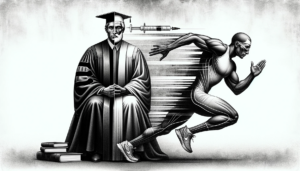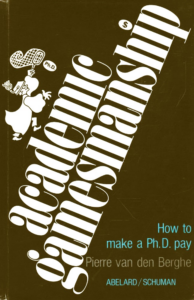The Similarity Between Academic and Athletic Misconduct
In the competitive world of higher education, the pressure to publish groundbreaking research and achieve recognition can be immense. This drive for academic success mirrors the high-stakes of professional sports, where athletes often turn to performance-enhancing drugs, like steroids, to gain an edge. In academia, the equivalent of these steroids can be seen in the practices of plagiarism and data falsification. These unethical shortcuts promise rapid career advancement but, when exposed, lead to severe consequences, tarnishing reputations and careers.
The analogy between steroids in sports and academic misconduct is striking. Steroids, by artificially enhancing performance, can catapult athletes to the pinnacle of their careers. In baseball, for instance, figures like Barry Bonds and Sammy Sosa, despite their innate talents, faced allegations of steroid use. Their subsequent records and achievements were overshadowed by these accusations, leading to serious doubts about the legitimacy of their accomplishments. Steroids, while acting as force multipliers, ultimately led to a legacy questioned and tarnished by suspicion and scandal.
In academia, plagiarism and data falsification play a similar role. These practices can lead to a rapid increase in publications, citations, and professional recognition, acting as a catalyst for career advancement. However, much like steroids, they are a double-edged sword. The cases of prominent academics such as Claudine Gay and Marc Tessier-Lavigne highlight the risks involved. These figures, renowned in their fields and presidents respectively of Harvard and Stanford, faced allegations that questioned the integrity of their work, resulting in their resignations. In general, when such accusations come to light, the fallout can be devastating, leading to censure, loss of credibility, resignation, or even dismissal. The initial gains from plagiarism and data falsification are overwhelmingly negated by the long-term damage to one’s reputation and career.
The comparison extends beyond the individual to the broader impact on the playground in question, whether the academic playground or the athletic playground. In sports, steroid use undermines the integrity of the competition and the health of the athletes. In academia, plagiarism and data falsification erode the foundation of trust and reliability that is crucial for the advancement of knowledge. They create a false image of progress, where none exists, misleading peers and diluting the quality of research in the field. The ripple effects of such actions can be far-reaching, affecting policy decisions, public trust in science, and the direction of future research.
In both spheres, the detection of these unethical practices often leads to a reevaluation of policies and safeguards. Sports organizations have increasingly implemented stringent testing and penalties to deter steroid use. Similarly, academic institutions have strengthened their plagiarism detection tools and ethical guidelines to preserve the integrity of scholarly work. These measures reflect a growing recognition of the importance of integrity and fair play, both on the field and in the halls of academia. Yet the safeguards for protecting academic integrity leave considerable room for improvement. The academics caught for plagiarism or data falsification, as with Claudine Gay and Mar Tessier-Lavigne, might easily have gotten away with their fraud except that outside parties happened to subject their work to scrutiny.
The use of steroids in sports and the engagement in academic misconduct such as plagiarism and data falsification are parallel narratives of the temptation to take shortcuts for immediate gain. They both serve as potent force multipliers that can propel individuals to heights otherwise unreachable in short spans of time or at all. Unfortunately, the detection of these practices is hardly inevitable. Lance Armstrong, for instance, was credited with seven Tour de France victories, before the evidence of doping by him came to light, leading to all his victories finally being vacated. But he might easily have gotten away with it.
Yet when the evidence of fraud to boost performance is finally uncovered, the repercussions are always severe, fundamentally undermining the very achievements the fraud was meant to bolster. The lesson in both academics and athletics is clear: enduring success is built on integrity and hard work; any deviation from these values is a disservice to oneself and the community at large; and when such deviation meets the light of day, it is dealt with severely.
What follows or four especially prominent cases of “academic steroids” being abused. After that, we briefly list twenty-five more such cases. These cases highlight that the abuse of “academic steroids” is widespread and that not nearly enough is being done to quash their use.
Four Notable Cases of Academic Plagiarism/Data Falsification
Claudine Gay (2024), the former president of Harvard University, faced a series of plagiarism allegations that ultimately led to her resignation. Before the fraud was discovered, Gay was the first black woman to lead Harvard University and had a distinguished career as a scholar and academic administrator. However, in December 2023, allegations of plagiarism surfaced, claiming that Gay had plagiarized portions of her dissertation and other academic works. The accusations were circulated through an unsigned complaint published in conservative journals, which added additional accusations of plagiarism to about 40 that had already been made by the same accuser.
The consequences of the plagiarism allegations were significant, leading to Gay’s resignation from Harvard University. The allegations, which were initially made public in December 2023, triggered a series of investigations into her scholarly work. Despite Gay’s ardent defense of her work and her assertion that she stood by the integrity of her scholarship, the mounting evidence and public pressure ultimately led to her resignation in January 2024. The case highlighted the serious repercussions of academic misconduct, even for individuals in the highest leadership positions within prestigious academic institutions.
[SOURCES:
https://www.nytimes.com/2024/01/02/us/harvard-claudine-gay-plagiarism.html
https://nypost.com/2023/12/11/news/claudine-gay-denies-newly-surfaced-plagiarism-accusations
https://www.thecrimson.com/article/2024/1/3/plagiarism-allegations-gay-resigns
https://www.nytimes.com/live/2024/01/02/us/claudine-gay-harvard
https://www.thecrimson.com/article/2024/1/3/plagiarism-allegations-gay-resigns]
Marc Tessier-Lavigne (2023), a renowned neuroscientist and former president of Stanford University, was embroiled in a data falsification case that ultimately led to his resignation. Before the fraud was discovered, Tessier-Lavigne had a stellar career, being credited with breakthrough research into the cause of Alzheimer’s disease and excelling at raising money from Silicon Valley during his tenure as the university’s president. However, in 2023, an investigation revealed that Tessier-Lavigne had authored twelve reports containing falsified information, including manipulated lab panels, digitally altered backgrounds, and misrepresented blot results. While he was the principal author on five of the reports, a scientific panel found that he may not have directly engaged in falsifying the data but may merely have failed to properly oversee his lab members who did. But the damage to his reputation was nonetheless devastating.
The fraud was uncovered after a series of articles in the Stanford Daily highlighted alleged incidents of research misconduct by Tessier-Lavigne, including the manipulation of research data and resistance to correcting it. Even though the investigation found no slam-dunk evidence of Tessier-Lavigne’s direct involvement in fraud or data falsification, it concluded that he could have overseen his lab better and was not aggressive enough in correcting the incorrect data once discovered. As a result, Tessier-Lavigne resigned from his position as president of Stanford University. The case shed light on the importance of upholding research standards and the severe consequences of failing to maintain the integrity of scientific data, even for individuals in supremely prominent positions within the academic community.
Video of 18-year old student journalist who broke the story, Theo Baker.
[SOURCES:
https://www.npr.org/2023/07/19/1188828810/stanford-university-president-resigns
https://www.washingtonpost.com/media/2023/07/28/theo-baker-stanford-president-tessier-lavigne]
J. Hendrik Schön (2002), once a rising star in the field of physics, experienced a dramatic fall from grace due to data falsification. Schön, a researcher at Bell Labs, was rapidly gaining a reputation for groundbreaking work in the early 2000s, particularly in the field of nanotechnology and semiconductor physics. His research, which promised revolutionary changes in electronics, included the development of molecular-scale transistors and advances in organic semiconductors. These achievements led to a string of high-profile publications in prestigious journals like Science and Nature, making him one of the most cited physicists during that period. Schön’s work was considered pioneering, positioning him at the forefront of material science and earning him accolades and attention from the scientific community.
However, Schön’s impressive career trajectory came to an abrupt halt when allegations of research misconduct surfaced. In 2002, discrepancies in his published results were noticed by fellow scientists, leading to further scrutiny of his work. It was discovered that Schön had fabricated and manipulated data in numerous instances, reusing data sets to represent different experiments. An investigation by Bell Labs confirmed these findings, revealing that Schön had committed extensive scientific fraud. The consequences were severe: Schön was dismissed from Bell Labs, his doctoral degree was revoked by the University of Konstanz, and most of his publications were retracted. This scandal not only ended Schön’s career but also highlighted the need for rigorous peer review and oversight in the scientific publishing process as well as the damaging impact of research misconduct on the scientific community and public trust in science.
[SOURCES:
https://en.wikipedia.org/wiki/Sch%C3%B6n_scandal
https://www.amazon.com/Plastic-Fantastic-Biggest-Physics-Scientific-ebook/dp/B002BZDDNS]
Robert A. Slutsky (1987), a prominent figure in the field of cardiology, saw his career derailed due to data falsification. Before the discovery of his misconduct, Slutsky was a rising star at the University of California, San Diego, where he was making notable contributions to cardiovascular research. His work, particularly in the area of angioplasty and heart disease, was highly regarded and widely published in esteemed medical journals. At his height, Slutsky was publishing one new paper ever ten days. Slutsky’s research was influential in the field, shaping understanding and treatment approaches for heart conditions. His promising career trajectory was marked by a rapid accumulation of publications and respect within the medical community, establishing him as a leading researcher in cardiology.
The unraveling of Slutsky’s career began with the discovery of discrepancies in his research data. In the mid-1980s, concerns were raised about the validity of his findings, leading to closer examinations of his work. An internal investigation by the University of California, San Diego, revealed that Slutsky had fabricated and manipulated data in numerous studies. This revelation led to the retraction of many of his papers, severely damaging his reputation and credibility. As a result of the investigation, Slutsky resigned from his position at the university. The case of Robert A. Slutsky became one of the most significant instances of scientific fraud in the medical field at the time. It underscored the importance of integrity in research and the potential consequences of misconduct. The scandal not only ended Slutsky’s career but also had broader implications for the field of cardiology, prompting discussions about the need for more stringent peer review and oversight in medical research.
[SOURCES:
https://www.latimes.com/archives/la-xpm-1987-04-30-mn-2837-story.html]
Various Cautionary Cases of Research Misconduct
Eric Poehlman (2005): A former professor at the University of Vermont, Poehlman was found guilty of fabricating data in research grant applications and numerous publications. He resigned and was the first academic scientist to be sentenced to prison for falsifying data.
Hwang Woo-Suk (2006): A South Korean stem cell researcher, Hwang was found to have fabricated data in two papers published in Science. He was dismissed from Seoul National University following the scandal.
Jon Sudbø (2006): A Norwegian researcher, Sudbø fabricated data in studies on oral cancer and NSAIDs. He was dismissed from his positions at the Radium Hospital in Oslo and the University of Oslo.
Glenn Poshard (2007): The president of Southern Illinois University, Poshard was accused of plagiarizing his doctoral dissertation. While he didn’t resign, he faced significant criticism and his doctorate was later reissued with revisions. A committee he appointed charged him with “inadvertent plagiarism.”
Scott Reuben (2009): An anesthesiologist and pain researcher, Reuben fabricated data in at least 21 studies. He was fired from Baystate Medical Center and his medical license was suspended.
Karl-Theodor zu Guttenberg (2011): A prominent German politician, Guttenberg resigned as Defense Minister after it was revealed that he plagiarized parts of his doctoral thesis. The University of Bayreuth revoked his doctorate.
Diederik Stapel (2011): A prominent Dutch social psychologist, Stapel was found to have fabricated data in at least 55 publications. He was dismissed from Tilburg University and several other institutions.
Marc Hauser (2011): A former psychology professor at Harvard University, Hauser was found guilty of eight counts of scientific misconduct, including data fabrication. He resigned from his position.
Pál Schmitt (2012): The President of Hungary resigned after his doctorate was revoked by Semmelweis University, following accusations that he plagiarized his thesis.
Yoshitaka Fujii (2012): A Japanese anesthesiologist, Fujii fabricated data in a record number of scientific papers (219, of which 172 have been retracted). He was dismissed from Toho University for research misconduct.
Annette Schavan (2013): Former German Minister of Education and Research, Schavan resigned from her ministerial post and had her doctorate revoked by Heinrich Heine University Düsseldorf after being found guilty of intentional plagiarism in her dissertation.
Jane Goodall (2013): The renowned primatologist and conservationist came under fire for plagiarism in her book Seeds of Hope. While she didn’t lose her academic positions, the incident led to the book’s release being delayed and the book itself being revised.
Haruko Obokata (2014): A stem cell biologist in Japan, Obokata claimed to have developed a method to create stem cells (STAP cells) easily. Guilty of data manipulation and fabrication in her research, she resigned her academic post and her STAP method was discredited.
Michael LaCour (2015): A graduate student at UCLA, LaCour’s study on changing minds on same-sex marriage was retracted due to fabricated data. This led to the revocation of his job offer from Princeton University.
Olivier Voinnet (2015): A prominent plant biologist, Voinnet, then at the ETH Zurich, faced multiple allegations of data manipulation in his research papers. Following an investigation, several of his papers were retracted, and he was suspended from his position.
Brian Wansink (2018): A former professor at Cornell University and director of its Food and Brand Lab, Wansink faced numerous allegations of scientific misconduct, including data manipulation published papers. An internal investigation by Cornell found that he committed academic misconduct, leading to his resignation and the retraction of several of his studies.
David Latchman (2019): Master of Birkbeck, University of London, Latchman published several studies with fabricated data. While he was not directly implicated with the falsification, his failure to supervise properly led to his demotion at University College London while retaining his role at Birkbeck.


